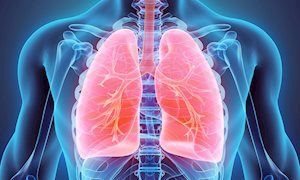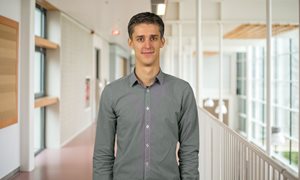 Kaman Chung, Cornelia Schaefer-Prokop and colleagues described the results of their research in Thorax.
Kaman Chung, Cornelia Schaefer-Prokop and colleagues described the results of their research in Thorax.
Ka Chung, member of the theme Rare cancers, will defend her PhD thesis on 12 June 2018.
Abstract
Objective:
To assess the performance of the Brock malignancy risk model for pulmonary nodules detected in routine clinical setting.
Methods:
In two academic centres in the Netherlands, we established a list of patients aged ≥40 years who received a chest CT scan between 2004 and 2012, resulting in 16 850 and 23 454 eligible subjects. Subsequent diagnosis of lung cancer until the end of 2014 was established through linking with the National Cancer Registry. A nested case-control study was performed (ratio 1:3). Two observers used semiautomated software to annotate the nodules. The Brock model was separately validated on each data set using ROC analysis and compared with a solely size-based model.
Results:
After the annotation process the final analysis included 177 malignant and 695 benign nodules for centre A, and 264 malignant and 710 benign nodules for centre B. The full Brock model resulted in areas under the curve (AUCs) of 0.90 and 0.91, while the size-only model yielded significantly lower AUCs of 0.88 and 0.87, respectively (p99%.
Discussion:
The Brock model shows high predictive discrimination of potentially malignant and benign nodules when validated in an unselected, heterogeneous clinical population. The high NPV may be used to decrease the number of nodule follow-up examinations.
Publication:
Brock malignancy risk calculator for pulmonary nodules: validation outside a lung cancer screening population.
Chung K, Mets OM, Gerke PK, Jacobs C, den Harder AM, Scholten ET, Prokop M, de Jong PA, van Ginneken B, Schaefer-Prokop CM.
Related news items

KWF grant for better selection of individuals and lung nodules in lung cancer screening
1 November 2021 The Dutch Cancer Society has awarded the consortium project ‘Multi-source data approach for Personalized Outcome Prediction in lung cancer screening’ with a grant of 1,425,000 Euro. Colin Jacobs will lead the work package on using artificial intelligence for accurate risk estimation of lung nodules. read more
Radiation boost lowers risk of prostate cancer recurrence
21 January 2021 An additional external-beam radiation dose delivered directly to the tumor can benefit the prospects of men with non-metastatic prostate cancer, without causing additional side effects. The risk of relapse within five years for these men is smaller than for men who did not receive this boost. read more
Evaluation of an AI system for detection of COVID-19 on Chest X-Ray images
22 May 2020 In the journal Radiology researchers from Radboudumc, Bernhoven Hospital and Jeroen Bosch Hospital described how an artificial intelligence system (CAD4COVID-XRay) can identify characteristics of COVID-19 on chest x-rays with performance comparable to six independent radiologists. read more
Is Google's lung cancer AI ready for implementation?
19 December 2019 In Nature Reviews Clinical Oncology, Colin Jacobs and Bram van Ginneken discussed the recent paper by Google AI in Nature Medicine on deep learning models for automatic detection of lung cancer from computed tomography. read more
Awarded KWF grants for Radboudumc researchers
18 December 2019 KWF is investing 2.7 million euros in five different studies at Radboudumc. The awards are part of the new round of funding by DCS, in which over 34 million euros will be granted to Dutch cancer research. We congratulate our researchers with this funding and wish them success with their great work. read more
